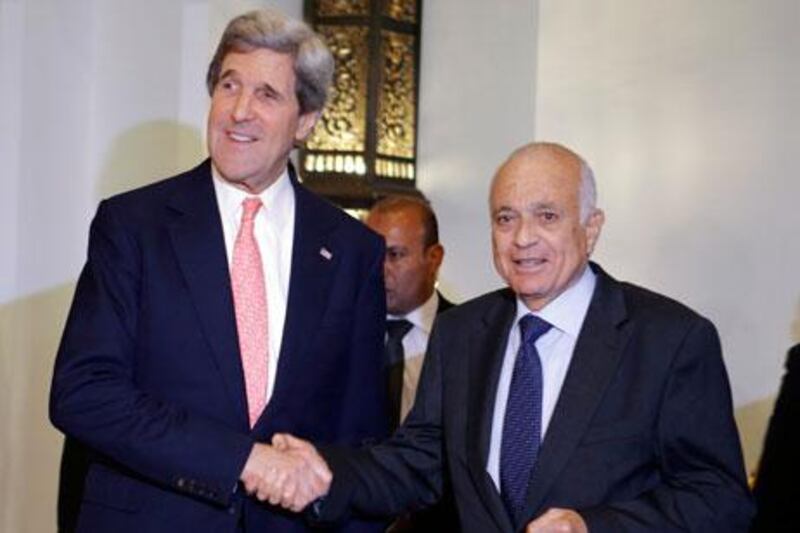TEL AVIV // Never in its 65-year history has Israel had such an offer: normal relations with every Arab state and a possible claim to land inside the Palestinian territories.
The US secretary of state John Kerry travels to the Middle East this week with stops in Jerusalem and Ramallah for talks on the Israeli-Palestinian conflict. His trip comes after he convinced the Arab League last month to revise its 11-year-old peace initiative to include more inducements for Israel.
But the government of Israel's prime minister, Benjamin Netanyahu, has reacted coolly to the renewed proposal, baffling critics with what many see as indifference to a landmark opportunity.
"We are speaking of an opportunity that must be seized to renew the diplomatic process," said Ehud Olmert, the former Israeli prime minister who came close to brokering a peace deal with the Palestinians in 2008. "It's a very important development," he said, and urged Israeli leaders to "stop making excuses" and jump at the offer.
Mr Kerry has been attempting to revive the peace process by using the Arab initiative as a sweetener.
First proposed by Saudi Arabia at an Arab League summit in Beirut in 2002, the plan initially demanded a full Israeli withdrawal from the territories it captured during the 1967 Arab-Israeli war.
In return for recognising a Palestinian state and finding a "just" solution for Palestinian refugees, the 22-member organisation would extend Israel normal relations and consider the Arab-Israeli conflict finished.
The offer represented a milestone for Israel but it never formally responded, and the plan was overshadowed by the second intifada, or Palestinian uprising, which began in 2000.
Nor was there much Israeli reaction to the sweetener the Arab League added to its initiative last month - with Mr Kerry's backing - that appeared to endorse minor land swaps rather than a full withdrawal from the Israeli-occupied Palestinian territories. That gesture would seem to allow Israel more flexibility during the process of drawing the borders of a Palestinian state.
Mr Netanyahu instead appeared to snub that compromise. In a speech made shortly after the new Arab League offer, he claimed the conflict was not "territorial" and demanded that Palestinians first recognise Israel as a national state for Jews, "no matter what the borders".
He did not explicitly mention the Arab Peace Initiative in his speech.
The tepid response leaves Mr Kerry frustrated in his peacemaking efforts, and has also confirmed to Palestinians that Israel is not serious about ending its 46-year occupation of the Gaza Strip, West Bank and East Jerusalem.
In private, officials in the Palestinian Authority accuse Mr Netanyahu of not wanting to end the occupation. So as not to upset Mr Kerry, they have refrained from publicly criticising the Israeli leader over his response.
Ibrahim Ibrach, a professor of political science at Al Azhar University in Gaza, said the Israeli response had increased Palestinian suspicion of the United States's intentions.
He said Mr Kerry's efforts would have been more credible had he sought a balanced approach - such as persuading Israel to stop construction of Jewish settlements, a key Palestinian demand for returning to peace talks, rather than asking Arab states to compromise.
"The focus here is about the regional situation, but you can't resolve that without a genuine effort" in stopping Israeli-settlement expansion and ending the occupation, Mr Ibrach said.
The last round of talks, in 2010, collapsed because Mr Netanyahu refused to stop construction of new settler housing.
Nevertheless, some Israeli officials have responded positively to the Arab League initiative. Tzipi Livni, the justice minister who is in charge of Israel's negotiations with Palestinians, called the offer "important".
But Mark Heller, a research associate at the Institute for National Security Studies in Tel Aviv, said it was far from clear whether Ms Livni could persuade Mr Netanyahu's government to respond with more enthusiasm.
In general, he said, Israeli officials wanted to show "some flexibility" on the Arab offer and, at the very least, "not appear to be the party responsible for failure to move it forward".





